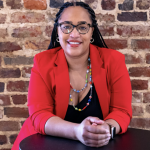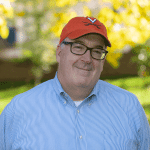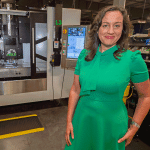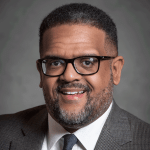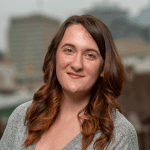Ecosystem insights
Va. startup funders weigh in on entrepreneurship landscape
Ecosystem insights
Va. startup funders weigh in on entrepreneurship landscape
Leaders from across Virginia’s entrepreneurial ecosystem discuss investing in new companies, challenges facing startups and advice for success.
RASHEEDA CREIGHTON
EXECUTIVE DIRECTOR, JACKSON WARD COLLECTIVE FOUNDATION, RICHMOND
WHAT LED TO YOU CO-FOUNDING JACKSON WARD
COLLECTIVE FOUNDATION?
JWC Foundation’s mission is to learn, grow and own in the Black community. The organization began when Kelli Lemon and I separately came to the realization that we needed a Black incubator in Richmond. For Kelli, the need was clear as she worked to open Urban Hang Suite, which remains the only Black-woman-owned coffee shop in Richmond. At the same time, I was working at Capital One as executive director of what is now the Michael Wassmer Innovation Center. So much great programming was happening in the space for entrepreneurs, and yet, many of the tenants in the building and participants in the program didn’t look like me. There were a mix of reasons: not knowing what was taking place, not being connected, marketing efforts, but regardless, it was clear we needed a space where we could gain the skills, network and resources to build sustainable businesses.
WHAT TRENDS ARE YOU SEEING AMONG STARTUPS RIGHT NOW?
We are seeing a lot of professional services and personal wellness businesses emerge. We are also continuing to see the trend of businesses starting from side businesses while people are working full-time jobs.
HOW DOES BEING AN ENTREPRENEUR-LED ORGANIZATION HELP YOU TO BETTER SUPPORT OTHER FOUNDERS?
I am a firm believer that lived experience is one of our most valuable tools. Our staff is made up of entrepreneurs, and those who we bring in to engage in any of our programming are also entrepreneurs speaking from lived experience. It is much easier to learn from those who aren’t speaking theoretically but who know what it’s like to walk this sometimes-difficult journey because their advice is practical, and they are willing to share the lessons learned — good and bad.
 RICH DIEMER
RICH DIEMER
MANAGING DIRECTOR, CAV ANGELS, CHARLOTTESVILLE
WHAT’S YOUR PROCESS FOR RECOMMENDING WHETHER YOUR MEMBERS SHOULD INVEST IN A COMPANY?
CAV Angels is a network of 160 accredited investors, all with a connection to [the University of Virginia], that vote with their checkbooks on the deals that we bring to them. We perform due diligence, share our DD report and schedule an all-member virtual pitch. My mission is to present members with a diverse assortment of fundable deals capable of delivering angel-type returns. Quite frankly, that is as much an art as it is a science, and [as] our due diligence process evolves with each deal, we consider whether it is a yes or a pass.
WHAT TRAITS DO SUCCESSFUL STARTUPS RIGHT NOW SHARE?
The key is the ability to pivot, to survive and even thrive in the current funding desert, to have the ability to convert adversity into opportunity and demonstrate true grit — not just talk about it. Business models need to be both durable and flexible.
WHAT ARE THE BIGGEST MISTAKES FUNDERS MAKE WHEN PITCHING?
Let’s start with the initial pitch deck. Pitch decks that are too long (12-15 pages should be plenty), too technical or too complex can be disqualifying. We look for founders [who] are both passionate and practical. It is just as important to demonstrate an ability to listen and have an open mind as it is to [make] a good pitch. Realize that knowing your customer is important and when you are seeking capital, we are also your customer. Understand that you are entering into a long-term partnership, and we like to see evidence that you value your reputation as much as we value ours.
 NANCI HARDWICK
NANCI HARDWICK
FOUNDER AND CEO, AEROPROBE; MELD MANUFACTURING, CHRISTIANSBURG
WHEN DID YOU KNOW MELD’S INDUSTRIAL METAL 3D PRINTING TECH WAS GOING TO SUCCEED?
I knew in the beginning that the MELD technology was a long shot. I was curious and optimistic about the challenge, but not sure of my capability to create success. In my journey from idea to manufactured product, I experienced many highs and lows. During the lows, I questioned my decisions, my capability and our chances of survival. When [R&D World magazine’s] R&D 100 [Awards] named our large-scale metal printing process the most disruptive new technology across the globe, it was early validation that this technology would change the world.
WHAT ADVICE DO YOU HAVE FOR FOUNDERS IN MANUFACTURING?
There is a tremendous amount of support available for manufacturing companies at the federal and state level. Virginia is a great state for manufacturing startups. Additive manufacturing — 3D printing — is a great example of a current opportunity for startups in manufacturing, which I see firsthand at MELD Manufacturing, where we make MELD [industrial 3D printing] machines. We’ve had so much demand for printed parts that we launched a separate company named MELD PrintWorks. Even at Aeroprobe, where we have been manufacturing avionics equipment for over 30 years, we are finding new markets with products using 3D printing.
WHAT CHALLENGES MIGHT ENTREPRENEURS NOT TAKE INTO CONSIDERATION WHEN STARTING A BUSINESS?
All entrepreneurs face the challenge of meeting the expectations we put on ourselves. The pressure doesn’t lessen with progress, because we then adjust our expectations and change the definition of success. I don’t know any short-term entrepreneurs. It’s a long-term commitment to an idea, a company and a team. Invest in your own physical and mental health to go the distance. Share the importance and purpose of your work with your family and friends. Find customers that find value in the product and are willing to walk the development journey with you. Work beside capable people who believe the world will be a better place if your company and product succeed.
 CONAWAY HASKINS
CONAWAY HASKINS
VICE PRESIDENT OF ENTREPRENEURIAL ECOSYSTEMS, VIRGINIA INNOVATION PARTNERSHIP CORP., RICHMOND
HOW HAS VIRGINIA’S ENTREPRENEURIAL ECOSYSTEM MATURED IN RECENT YEARS?
Virginia has a variety of vibrant startup ecosystems which reflect the unique dynamics of our regions and industries. Over the past few years, we’ve seen increases in the number and dollar amounts of venture capital deals going to Virginia companies, and the number of patents filed now exceeds pre-COVID levels. We have also seen a steady increase in the R&D funding flow into Virginia universities, and the commonwealth remains one of the top three or four states for companies securing federal innovation funding via the Small Business Innovation Research and Small Business Technology Transfer programs. These are all great signs of ecosystem growth and maturity.
ARE MORE STARTUPS REALLY USING AI, AND IF SO, HOW?
Yes, we see more and more startups that use AI to automate business processes and streamline the work of employees. It can help efficiency and productivity, especially for young companies that need to conserve cash. Just as interestingly, we are also seeing wider adoption of AI by other ecosystem players such as accelerators, incubators, economic development agencies and venture capital funds.
HOW DOES VIRGINIA’S ECOSYSTEM COMPARE WITH THOSE IN OTHER STATES?
Over the years, Virginia has steadily developed robust resources, which makes us highly competitive with other states. For example, our venture investment program will bring over $170 million in new venture capital funding into the state over the next 10 years via the federal State Small Business Credit Initiative, which will be leveraged by more than $200 million in private-sector venture capital dollars. This program is now being recognized as a potential national best-practice model. Another example is the Virginia Accelerator Network, a consortium of nonprofit accelerators, incubators and innovation hubs spread throughout the state who all serve high-growth, innovation-led startups. The VAN collaboration optimizes how Virginia’s ecosystems serve entrepreneurs, which gives us a competitive edge over other states. Most other states lack such a network.
 DEBBIE IRWIN
DEBBIE IRWIN
MANAGING DIRECTOR, LIGHTHOUSE LABS, RICHMOND
YOU RAN SHENANDOAH COMMUNITY CAPITAL FUND BEFORE MOVING TO LIGHTHOUSE LABS. HOW DOES METRO RICHMOND’S ECOSYSTEM COMPARE WITH THE SHENANDOAH VALLEY’S?
The type of support that founders need, outside of industry specifics, is usually very similar. From overall business and operations support to community and mental/emotional support, founders need a place where they can ask hard questions and get direct feedback. I see more similarities in the types of startups each market is working with than differences. There is a lot of innovation in both markets, just in different industries, but there is definitely more density and diversity of industries in the Richmond ecosystem, which is exciting.
HOW IMPORTANT ARE EVEN SMALL AMOUNTS OF CAPITAL FOR STARTUPS?
Nondilutive funding is crucial to startups, especially for underrepresented founders. There are high barriers (although sometimes necessary) to entry for founders when it comes to getting through market validation to product market fit. That time between those two stages is also often when entrepreneurs hit the entrepreneurial trough of sorrow. During those mentally taxing times, being able to have some money in the bank to push through and keep up with pivoting and testing can often be make-or-break for many startups.
 PAUL NOLDE
PAUL NOLDE
MANAGING DIRECTOR, 757 COLLAB; EXECUTIVE DIRECTOR, 757 ANGELS POWERED BY VENTURESOUTH, NORFOLK
HOW ARE THE ENTREPRENEURIAL ECOSYSTEMS ALIKE IN RICHMOND AND HAMPTON ROADS?
Both ecosystems are at a point where stakeholders are trying to find alignment around what industries each region can double down on from a “center of excellence” perspective. While both regions have similar entrepreneurial assets, I’ve observed a closer alignment between these stakeholders in the Hampton Roads region. In some cases, it’s due to who has a seat at the “regional leadership table,” and in other cases it’s due to how particular organizations are structured. Where Richmond seems to excel vis-à-vis its entrepreneurial ecosystem is in the density of founders choosing to call RVA home and the number of Fortune 500 [companies] located there that could present channel partnership opportunities for startups.
WHAT MAKES 757 COLLAB UNIQUE IN VIRGINIA?
There are certainly other entrepreneurial support organizations in the state that offer incubation, acceleration and funding resources, but I think 757 Collab differs in two ways: the breadth and scope of services under one roof, and how active its affiliated angel network is. Collab is the only ESO [entrepreneur support organization] that has an incubator, accelerator, angel network and fee-for-service pre-acceleration offerings under one common brand. The organization is certainly the sum of its parts, with each line of business having achieved brand recognition in [its] own right. But the combination of these resources on one platform makes for a very compelling venture hub to attract the most promising startups in the region and beyond.
WHAT ADVICE WOULD YOU GIVE ENTREPRENEURS?
Be humbly confident and approach your venture with a firm hypothesis on where you think the industry in which you’re operating is headed from a macro level.
-


